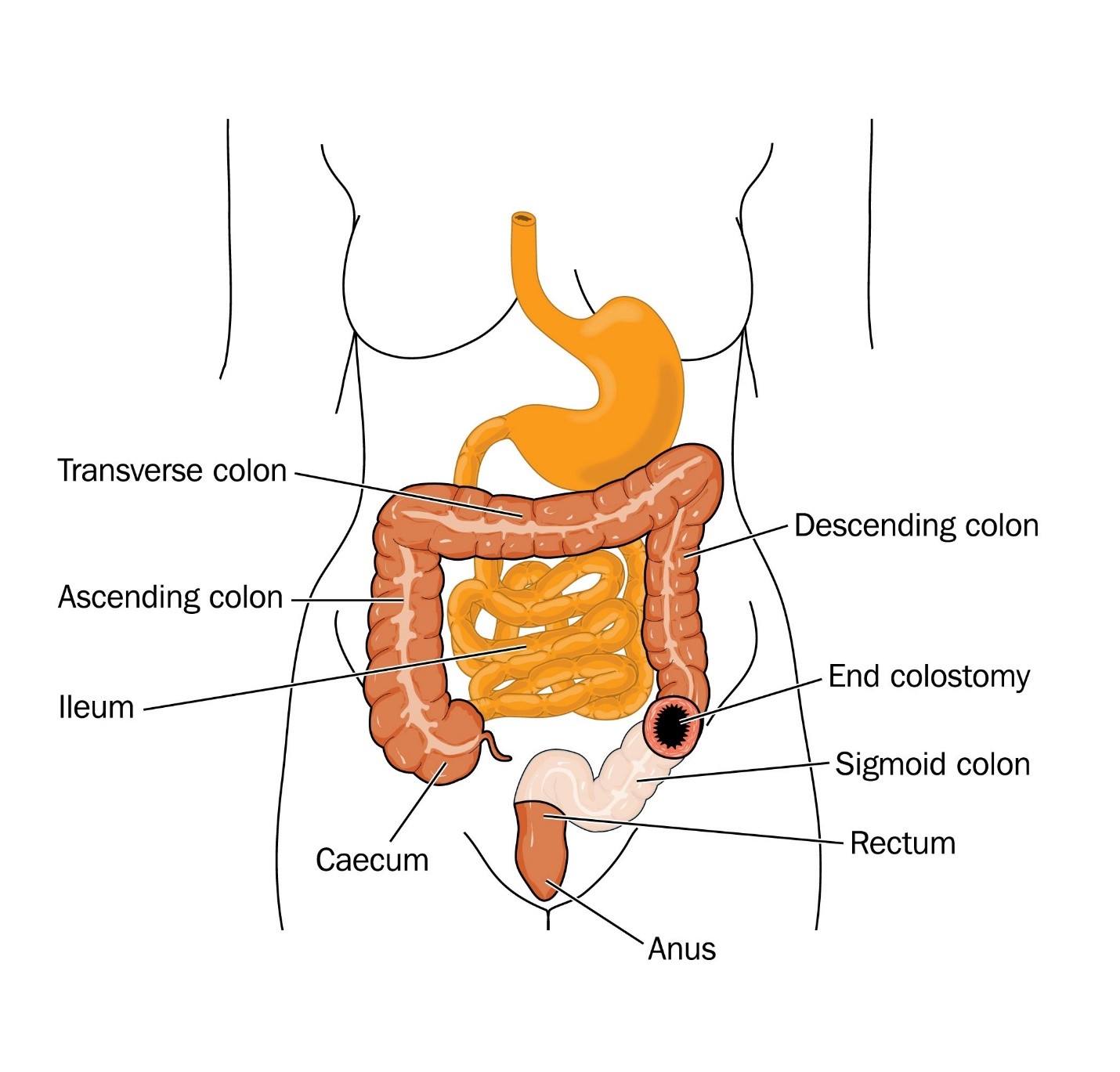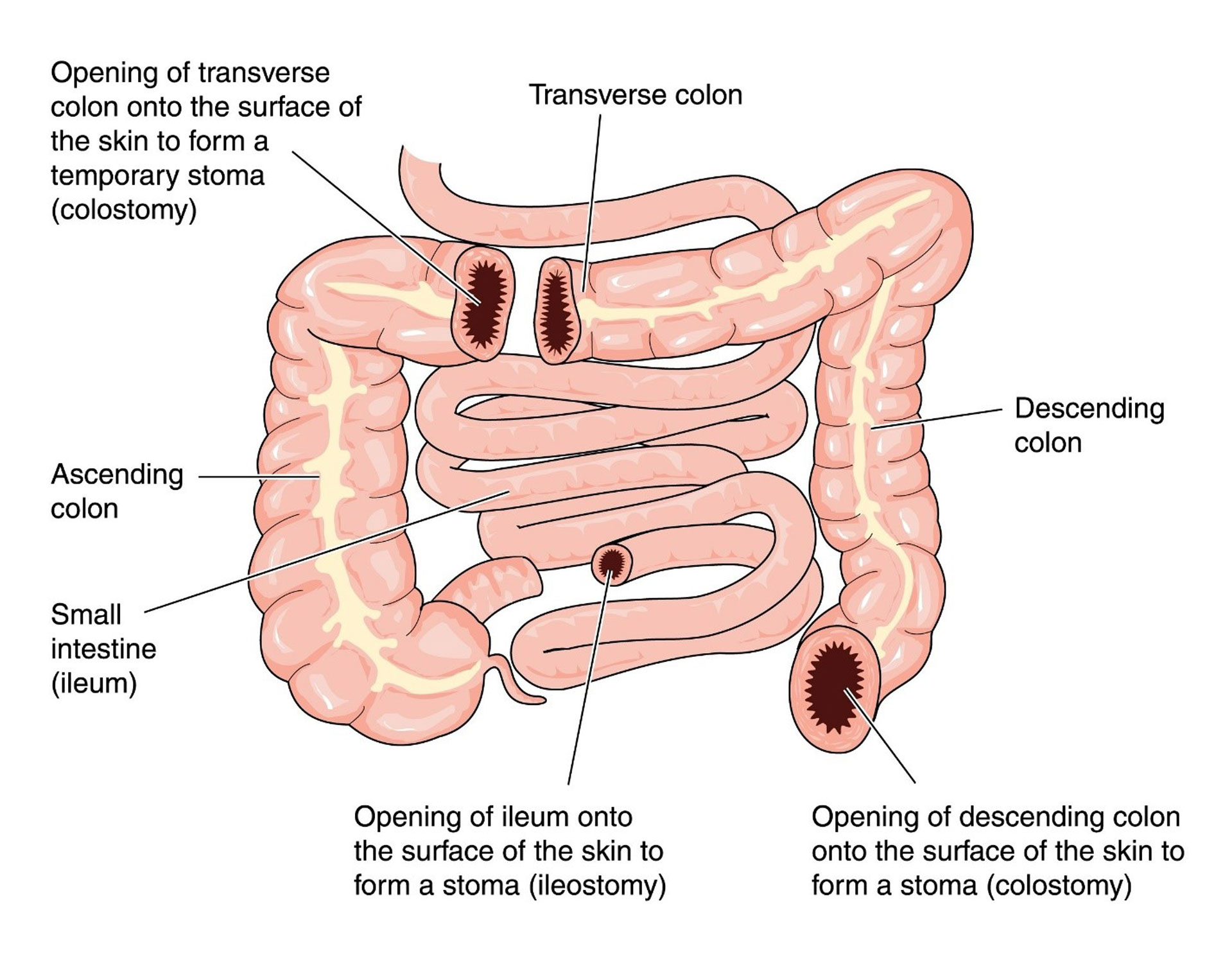Conditions And Treatments
Home / Areas Of Specialty / Ostomy
Ostomy
What is an ostomy:
An Ostomy is a surgically created opening between an internal organ and the abdominal surface. Your surgeon will bring out a part of your bowel to the surface of abdominal wall as an opening. Intestinal waste is eliminated through the ostomies when a normal intestinal continuity is not possible. It can happen from a variety of different conditions and circumstances like Cancer, Inflammatory bowel disease, bowel perforation or obstruction ,infection, bleeding, diverticulitis, trauma from any reason.
Types :
However, different parts of the intestine can be brought to the surface to create an ostomy. Broadly, if it’s a part of the colon then it is called a Colostomy and if part of the small intestine, then we call it as ileostomy.
Temporary Or Permanent Ostomy
Firstly, an ostomy can be temporary when your surgeon can reverse or close it after some time. Secondly, it can also be a diverting loop ileostomy (When Small bowel loop is brought out to the surface), when surgeon performs this procedure to temporarily divert the stool so that it does not reach the surgical anastomotic site, thus allowing the healing. A loop ileostomy will have 2 openings as the bowel is divided in the middle and your surgeon will bring out both proximal and distal ends of the bowel to the abdominal surface. Common scenarios, when your surgeon performs this for the surgical treatment of Rectal cancer, complex or complicated diverticulitis, bowel obstruction or other infections. Another keypoint, average daily output of an ileostomy is about 500 cc per day but may be up to 1,000-1,500 cc in a day.

It is very important to monitor the daily ileostomy output. Excessive output can cause dehydration and lead to electrolyte imbalance with related complications and can affect the kidneys. It is very important to contact your surgeon if the output is high or go to the emergency room to avoid dehydration and related conditions. Your surgeon or the ostomy nurses can give you a list of foods or medications to control output and make the consistency thicker.
You should learn to monitor the amount and consistency of your bowel movements. Outputs consistently above average levels may put patients at risk for dehydration, and a sudden drop in output associated with abdominal pain may indicate constipation or blockage. It may take some time for the patients to adapt to the ostomy functions.

Activities And Restrictions
Having an ostomy should not restrict you from normal routine activities. Also, patients can perform normal bathing and shower or swimming activities. Having an ostomy should not affect your travel or work-related activities. Additionally, an ostomy should not affect your sexual activities in any way. You should be able to resume normal sexual activities after healing from the surgery. But you should avoid heavy weightlifting, strenuous exercises and contact sports.
Complications From The Ostomies
Most common ostomy-related problem is local skin irritation from the stoma or from the stoma appliance. Most of these are minor and can be managed with some local care with the use of skin barriers or remedies or a change in the type of appliances. Wound and ostomy care nurses can be very helpful in the management of these conditions.
Dehydration and high output are other complications that can happen especially with the ileostomies. It is important to recognize the symptoms of dehydration like weakness, body aches, change in mental status, low urine output. Also, it is very important to keep drinking enough fluids and in severe dehydration condition may need to go to nearest emergency room. Reduced ostomy output can happen as a result of any blockage and can cause abdominal pain, nausea and vomiting.
Hernia around the ostomy site is another common condition and can present as a bulge around the stoma. An ostomy belt can be worn sometimes to help relieve the symptoms. Sometimes, you may need a surgical intervention if you have bowel obstruction or pain. Please discuss with your surgeon if there are any concerns or go to the emergency room if needed. Prolapse of the ostomy is another condition when part of the ostomy protrudes outside and sometimes may need surgical revision.
How to get rid of ostomy?
Ostomy or Colostomy reversal is a complex surgery and you can discuss the options with your colorectal surgeon.
What is a colon and Rectal Surgeon? Is Dr Singh a Board-certified Colorectal surgeon? and where does he perform his procedures.
Colon and rectal surgeons are experts in the surgical and non-surgical treatment of diseases of the colon, rectum, and anus. They have completed advanced surgical training in the treatment of these diseases, as well as full general surgical training. They are well versed in the treatment of both benign and malignant diseases of the colon, rectum, and anus and are able to perform routine screening examinations and surgically treat conditions as and if needed. Dr Singh is a double board certified in Colon and Rectal Surgery and General surgery. His practice is located in Phoenix, Glendale and Scottsdale, AZ.
For more details please click on the following links :
Ostomy Expanded Version | ASCRS (fascrs.org)
Home – Welcome To The Colon And Rectal Care Center Of Phoenix! (colorectaldoc.com)

